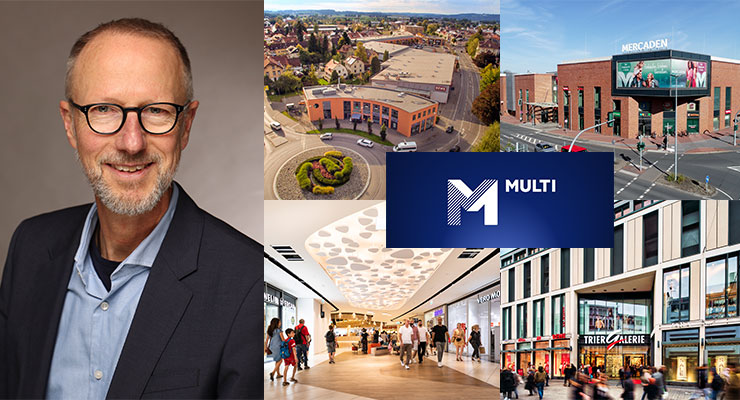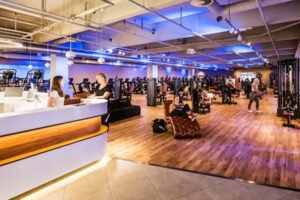ACROSS: You took over as the new Head of Germany at Multi at the beginning of November 2023. The striking thing about your biography is that you have been focused on retail real estate from the beginning of your career and have shaped it from a wide variety of roles.
Jörg-Michael Zimmermann: I have spent the last 10 years on the other side of the desk – on the investor side. Before joining Multi, I was the Head of Asset Management Shopping Center International at Union Investment for seven years. Before that, I worked at Commerz Real AG. I also spent 16 years in various national and international positions at ECE. My primary focus there was on leasing. Other roles during the early phase of my career included working on the tenant side at McDonald’s. I have always been interested in retail property, and I’ve been able to broaden my expertise from very different angles. I thoroughly enjoyed each of my roles and have benefited tremendously from being able to understand all sides.
ACROSS: Being familiar with the investor side is a particular advantage at the moment.
Zimmermann: That’s absolutely correct. I now sit opposite those in my previous role when talking to clients. It makes it much easier to discuss what’s going well or badly and what needs to be done. That’s exactly what I’ve come here to do: to apply my knowledge from a wide perspective and to make the processes at Multi Germany even better and more resilient to better serve the market. Enhancing Multi’s Property-, Asset- and Leasing Management capabilities are my absolute priority for Multi Germany.
ACROSS: Germany is Multi’s ´ country with the highest number of assets under management. How did that come about?
Zimmermann: That is credit to the team and to my predecessor. Multi’s goal was to gain more market share in Germany. To achieve this, we have actively targeted new management mandates over the last few years. Our teams are strong, we have a good and comprehensive product to offer, and clients believe in us. That’s why Multi has been so successful and why we were able to take over portfolios like KOPRIAN IQ’s which comprises six shopping centers, last year. Multi Germany is also geared up for future growth– we have almost 100 professionals and there are huge property and asset management opportunities within the German retail sector.
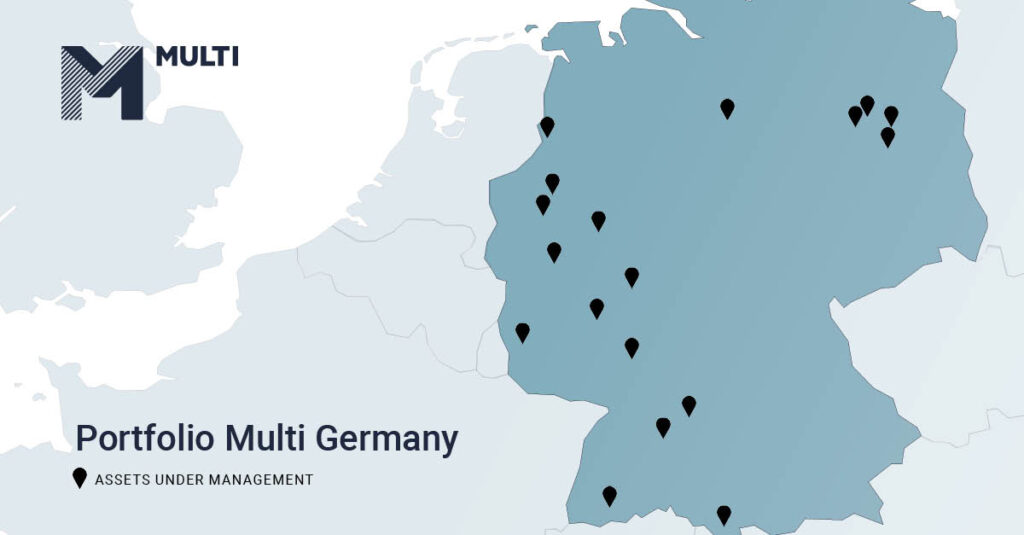
ACROSS: What is your assessment of this transaction? Is KOPRIAN an easy portfolio?
Zimmermann: I don’t think in terms of things being easy or difficult, good or bad. There are always things that need improvement and further development. That’s my real estate philosophy and I firmly believe that. If there’s one thing I’ve learned, it’s that every center has its own unique set of challenges. It all depends on the size and location and applies in the same way to the Mall of Switzerland, for example, as it does to a small neighborhood center. Also, solutions – and very good solutions – can always be found. Having that type of mindset makes all centers equally important to us.
ACROSS: Nevertheless, general market challenges exist in Germany.
Zimmermann: That goes without saying, but when you’re dealing with bricks-and-mortar retail, the biggest challenge is always the same: creating absolutely customized solutions for each location. The days of “one size fits all” are long gone. A challenge like e-commerce I see as opportunity, not as a threat. Retail property management is about doing very distinct things aligned with the owner’s respective strategy. Not every investment fund has the same objectives, nor do the same opportunities exist at every location. Both sides – the requirements of the owner as well as the requirements of the respective location – need to be clearly defined, and that is where the greatest challenges and opportunities lie.
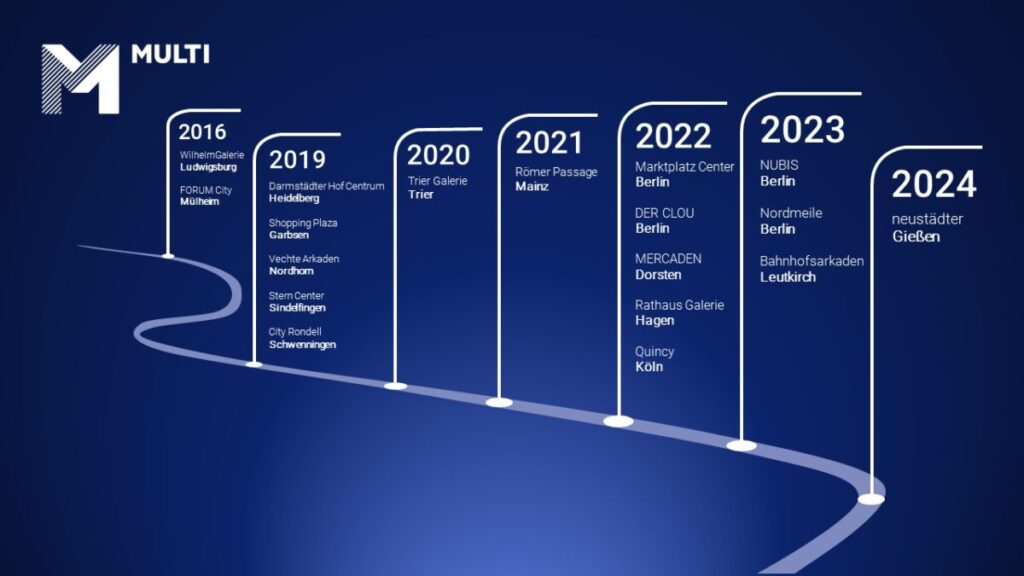
ACROSS: You’ve been in your position for roughly two months now: What does Multi represent in Germany? What is your USP?
Zimmermann: We are part of the Multi Cooperation and, as such, belong to a very strong brand. Multi is one of the largest independent retail managers across Europe with roughly 600 professionals working in 14 countries. I experienced the company’s strengths in my previous positions in Poland, Turkey, and Portugal. Multi offers all disciplines – asset management, property management, redevelopment to mention a few – under one roof and is a high-class and credible partner for anyone in retail real estate. Multi Germany benefits from that.
ACROSS: In what way?
Zimmermann: Multi works in a very customer-oriented way. By `customer’ I mean three groups of people. Firstly, the asset’s owner and investor; a second customer, our tenants; and a third customer, the people visiting our assets. One of the reasons we have good relationships with all three is because our processes are flexible and not standardized down to the smallest detail. We are like a speed boat. We have flat hierarchies, fast reaction times, and we work in a creative manner. Decisions are made quickly. I, personally, can work in a very entrepreneurial way. We are a well-managed, agile company with all the advantages and support of a large corporation. That combination is unique within the market and allows us to offer high quality at a competitive price.
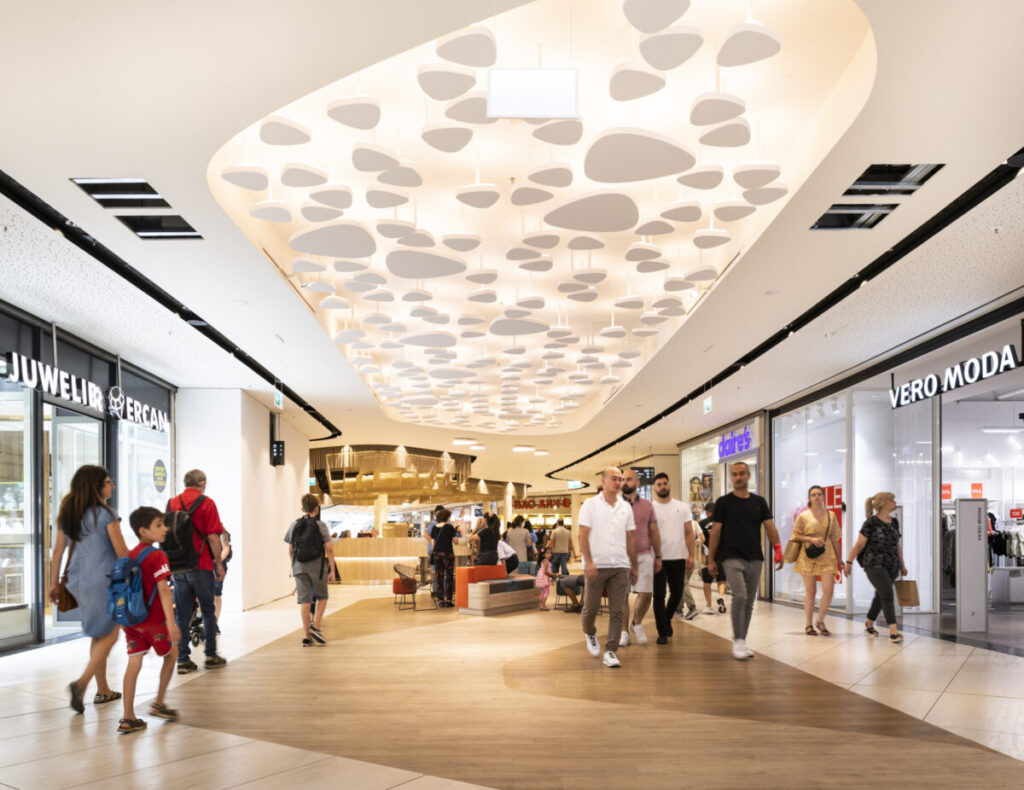
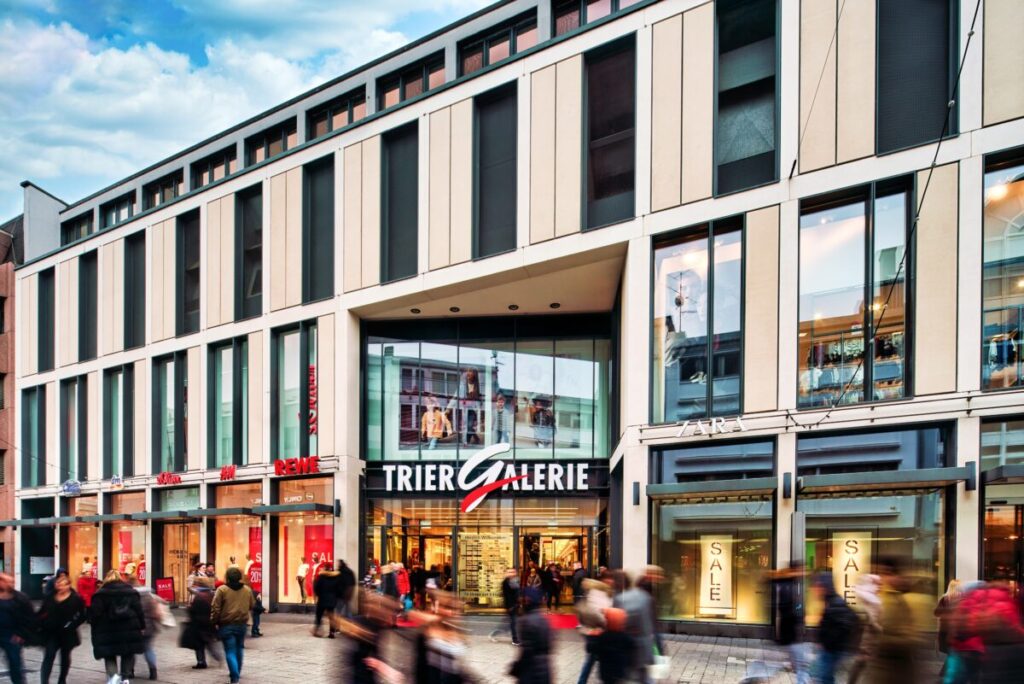
ACROSS: What is your assessment of the German retail structure?
Zimmermann: We have always tried, throughout the market cycle, to find the strongest and most suitable tenants for each of our centers. The definition of who are the strongest retailers varies over time, of course. The list of well-established retailers who have disappeared is long. Value retail has been a major trend in recent years. TK Maxx and Action, for example, are on the rise. We work with the tenant mix that is most successful and expansive at any given time, and we systematically build relationships with our tenants. At Multi there is a central leasing management team whose core task is to establish international connections with tenants. We manage more than 6.000 stores in our overall portfolio and have good relationships with almost every retailer active in our markets. Tenants are currently having to deal with issues such as staff shortages, which can have a huge impact on opening hours and quality. Customer behavior has also changed. In some cases, footfall still hasn’t returned to 2019 levels. The link between the digital and real estate worlds needs to be strengthened. Despite all of that, one thing is quite clear: Really good sales are generated by having the right retailers at the right locations.
ACROSS: Nevertheless, value retail formats have been criticized for making locations “uniform and boring”.
Zimmermann: I don’t see any danger there. If we look at shopping centers which are in downtown areas, for example, we now see new, large retailers that we would never have combined with our portfolio of retailers in the past. But these combinations have now been made in response to changing customer behavior. I am in favour of clustering retailers to some extent within the centers. Customers, however, like to see a mix of retailers across price ranges. To put it bluntly: Marc O`Polo pants are being worn with Primark sweaters. So, if the customers are happy to mix and match, why shouldn’t we be?
ACROSS: Retail parks have been one of the winning formats since the onset of the pandemic. With respect to the Multi portfolio: What differences do you see in the performance of retail parks compared to traditional shopping centers?
Zimmermann: Retail parks work well in locations where they make sense. The success of retail parks is a matter of clear positioning, convenience, parking spaces, accessibility, and retailers that correspond with this clear positioning. However, I do not believe that retail parks need to be the winners and shopping centers the losers. The present situation is far too dynamic for that. There is a certain degree of mixing the formats, especially in city centers. It is more a question of whether the traditional definition of a shopping center is still valid with the growth of leisure offers or other integrated services, such as medical centers.
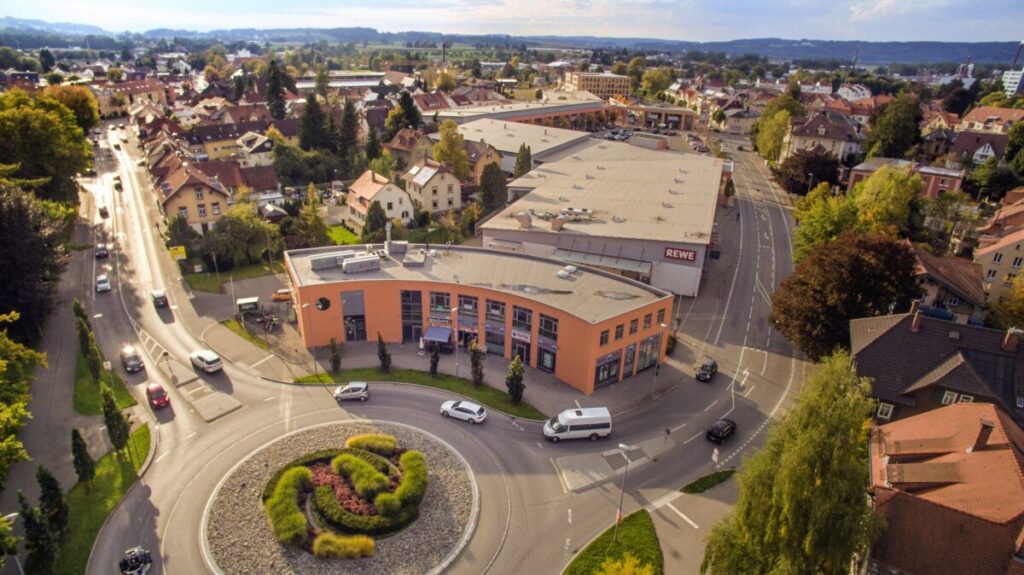
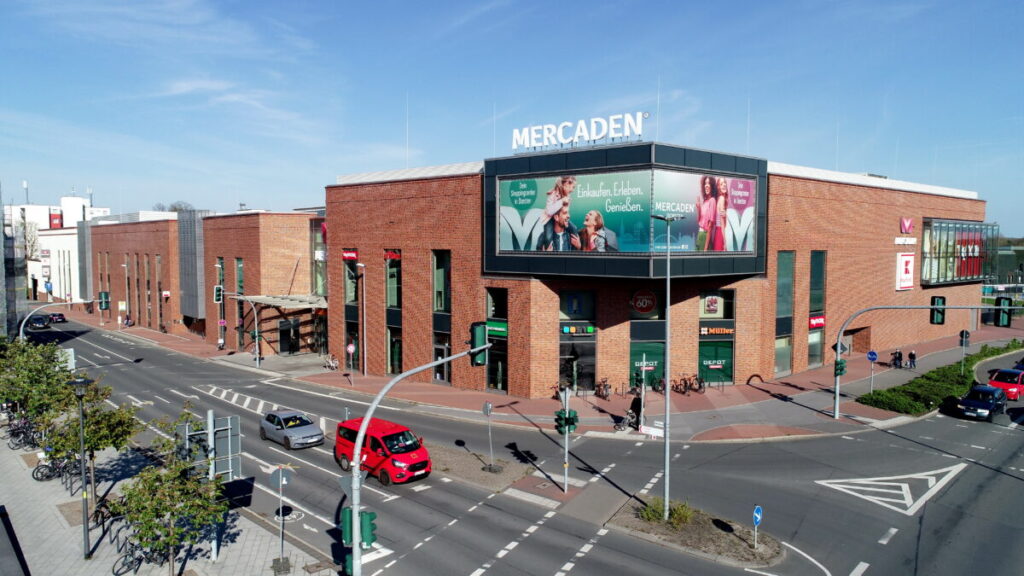
ACROSS: Even though you are the Head of Multi Germany, you have years of international experience. What differences do you see among the individual European markets in terms of customer behavior?
Zimmermann: There are differences in mentality. In Poland, for example, customers tend to be more optimistic and eager to spend. That was also reflected by the fact that they returned to shopping centers more quickly following the coronavirus crisis. The entire industry unanimously agrees that experiences must be offered. Centers in other countries are sometimes further ahead in that respect. In Germany, customers also want to do more than just shop for necessities, but they sometimes require a bit more enticement We are working on offering customers the things we think they will need but which they are not aware that they need yet. Creative design is definitely the order of the day – customers need to be reminded of what shopping centers can offer.
ACROSS: You have previously said that one of the biggest challenges was a lack of personnel. Do you have any solutions to this particular problem?
Zimmermann: Motivated, good employees clearly make a fundamental difference within companies – and even more so in bricks-and-mortar retail. My solution is a personal one: I firmly believe in the importance of leading by example. Multi’s own top priority is to attract, retain and motivate good employees. Simply put, that means working with a smile even when the job is challenging. It’s a question of creating a sense of purpose and identity and of being a role model. I always try to show openness and transparency and to listen to suggestions – wherever I work. However, that can only be achieved if you can authentically show that you enjoy the work that you do. At the end, this also attracts new talent from outside the company.
ACROSS: As you mentioned earlier, motivated employees make for a positive shopping experience. Unfortunately, the reverse is also true. Does center management need to exert more influence on retailers when it comes to employees?
Zimmermann: Good center managers remain in constant contact with retailers and point out problems to them as well, this has not changed over the years. I often see communication barriers within big retail chains. Many problems simply go unnoticed at the upper levels of these retailers. It’s our job to address such issues, also at a higher level, in order to ensure quality – while simultaneously respecting the division of roles between center management and retailers.
ACROSS: How important is refurbishment at Multi Germany?
Zimmermann: Refurbishment is, without a doubt, a key focus for the industry. The term, however, is very flexible. Not every minor change falls into this category. Many improvements are simply day-to-day business. The issue of refurbishment is heavily dependent on the owner and whether or not and how much money they want to invest. A number of locations need to be redeveloped and improved well beyond a business-as-usual level. You have to invest in quality of experience and quality of stay, in tenants, and in functionalities – and managing that is one of our areas of expertise and core investment. Our best-in-class inhouse architectural team provides every service needed in that respect.
ACROSS: In refurbishments but also in general, it is clear that the relationship between investors and center management has changed enormously.
Zimmermann: Yes, and that’s why being familiar with both sides is so important. I exaggerate to make a point, but here was a time when the center management defined the goals and the owners, the Excel experts, ticked them off. That has changed significantly. Owners now have a great deal of retail expertise in both asset and fund management. Of course, the distribution of roles has remained the same. As property managers, we make proposals, develop initiatives, and present them for approval. The owners make the decisions. However, there is much more discussion and informed debate. This is healthy, and positive.
ACROSS: As the new year just started, the question remains as to what should be expected in 2024?
Zimmermann: Of course, we will be facing some economic headwinds in 2024. But retail is still performing better than some of the other real estate asset classes. Because of this, we expect increased investment interest in the sector. In day-to-day business I think we need to return to the fundamental approach of the industry: navigating the current conditions, every one of us doing the best possible job, and designing and managing modern retail real estate in the best possible way.
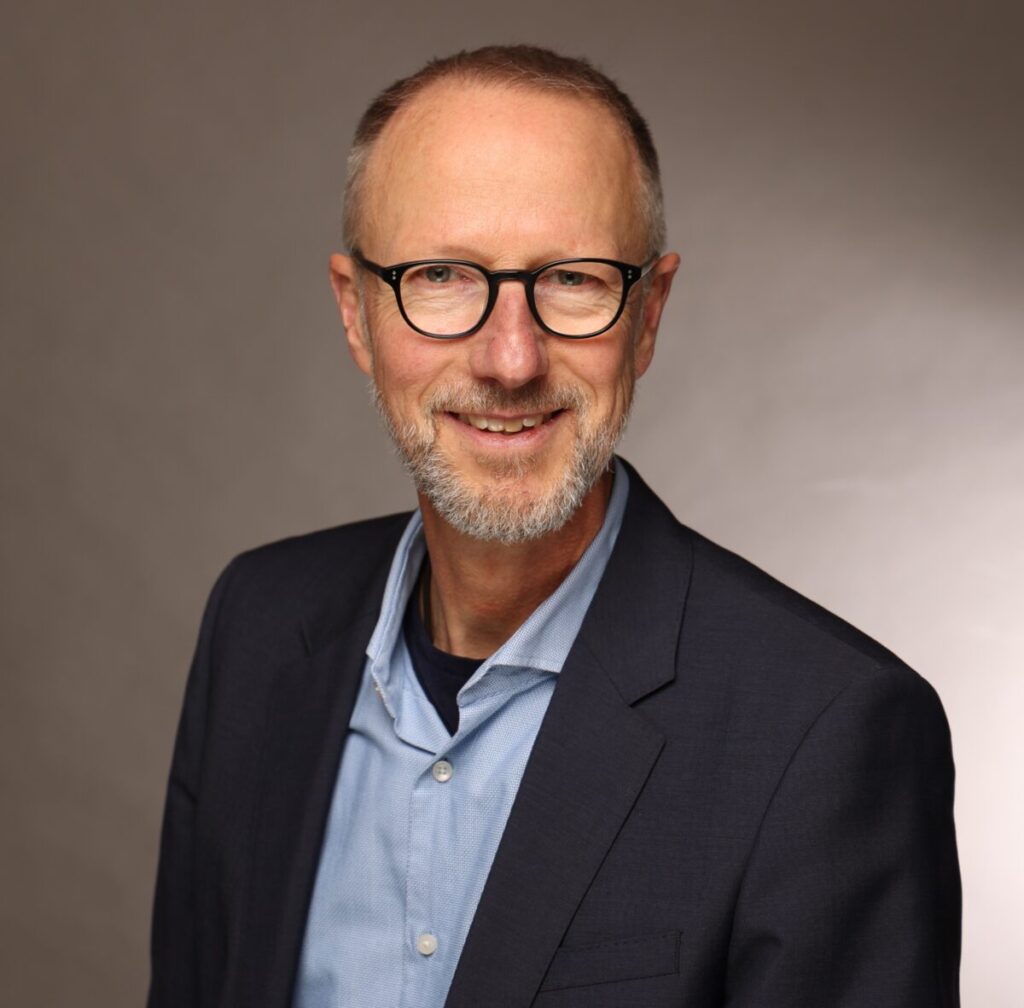
Jörg-Michael Zimmermann
Jörg-Michael Zimmermann took over as the Head of Multi Germany in November 2023. He succeeded Hubert Stech, who held the position for six years. Multi Germany manages 18 locations in Germany. The portfolio is spread across Germany and covers various formats, including traditional, downtown shopping centers, as well as mixed-use assets, retail parks and office buildings.

